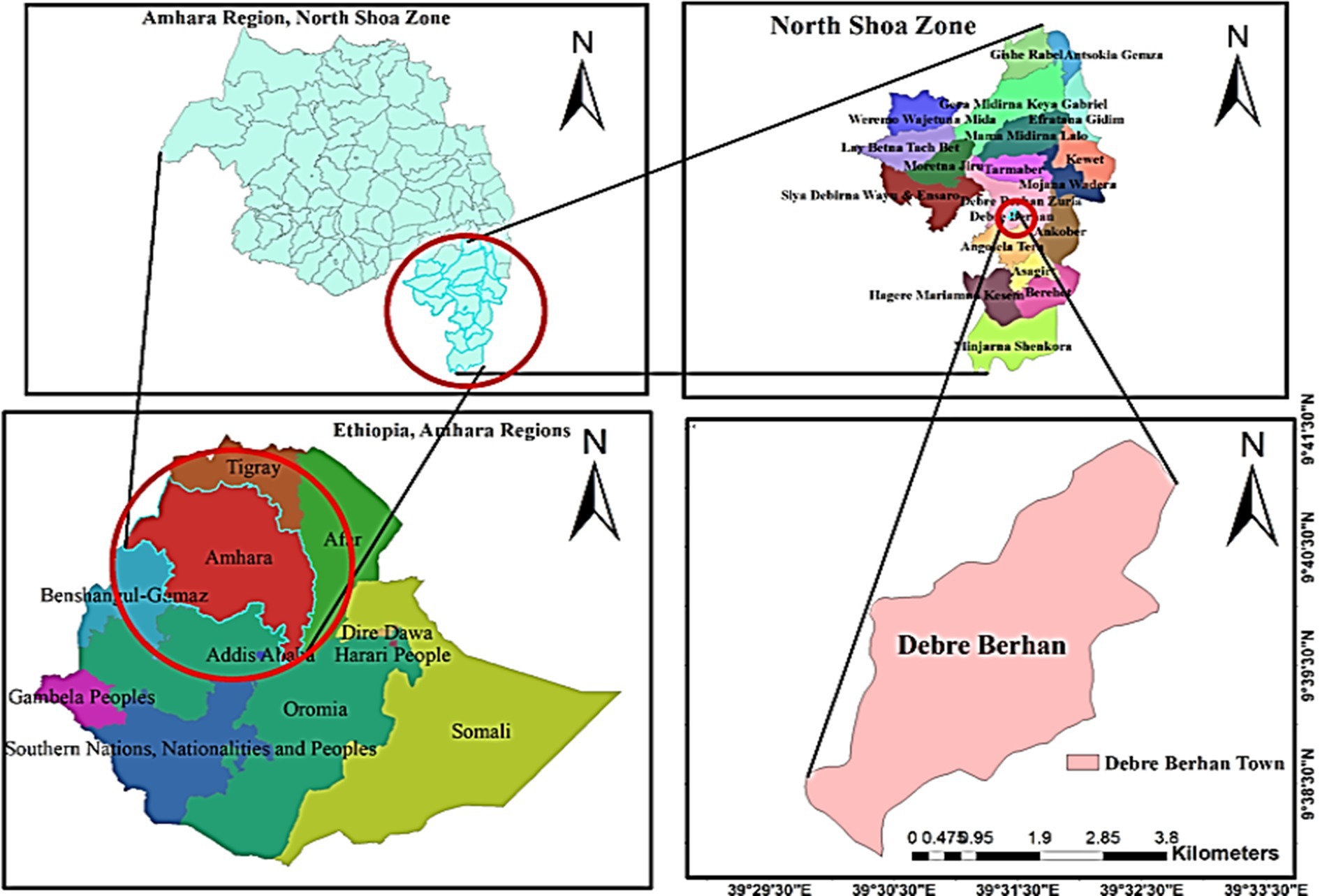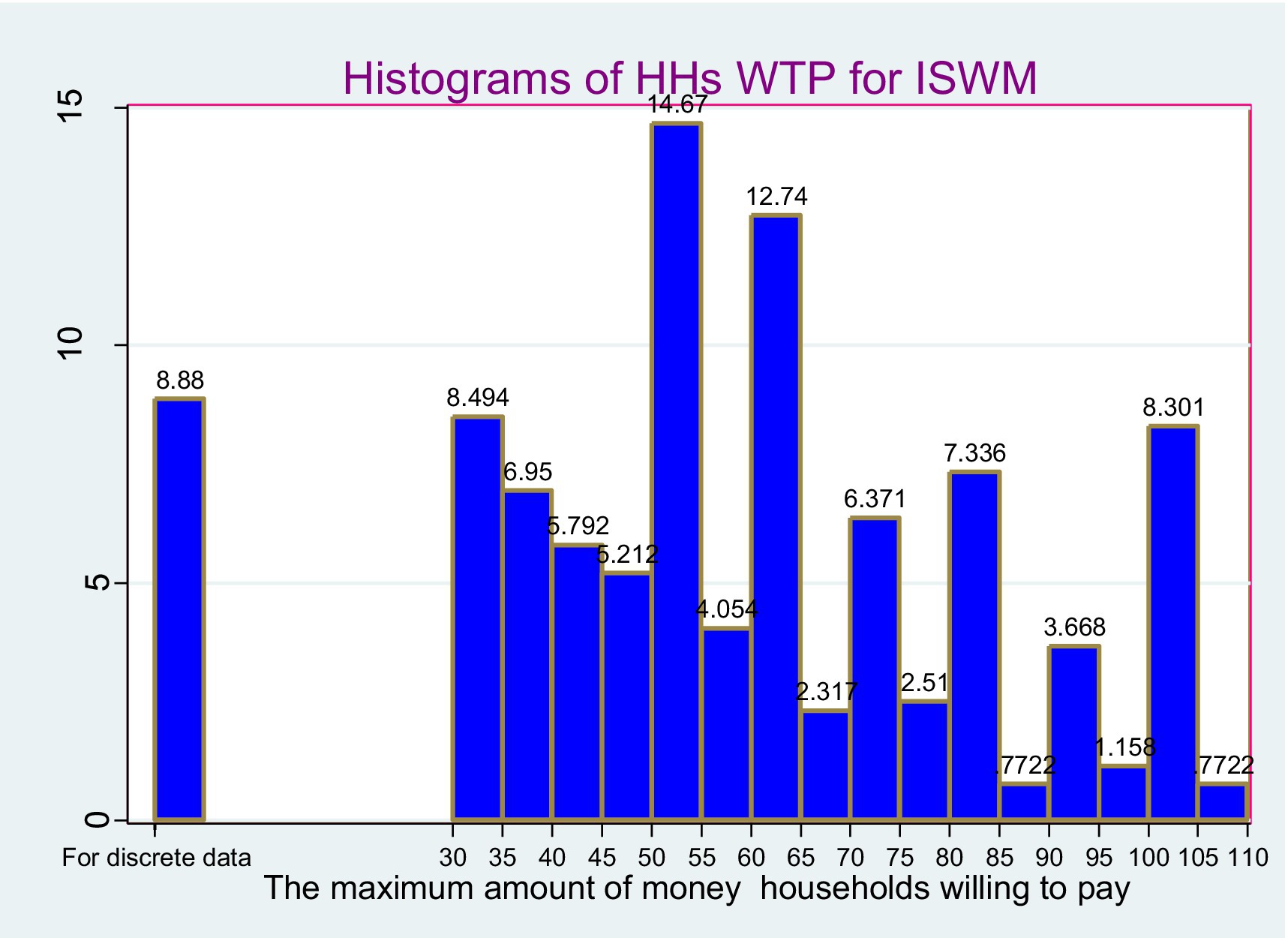- 1Department of Epidemiology School of Public Health, Asrat Woldeyes Health Science Campus, Debre Berhan University, Debre Berhan, Ethiopia
- 2Wondimu Sema Alemu—Department of Epidemiology, Deber-Berehan Health Science College, Debre Berhan, Ethiopia
- 3Amare Gebeyehu—Department of Epidemiology School of Public Health, Asrat Woldeyes Health Science Campus, Debre Berhan University, Debre Berhan, Ethiopia
- 4Belachew Tekleyohannes Wogayehu, Department of Environmental Health, Debre-Berhan Health Science College, Debre Berhan, Ethiopia
Background: The willingness to pay for better solid waste management serves as a framework that allows households to contribute a maximum amount of money to service improvement.
Objectives: This study determined the willingness to pay for improved solid waste management and the associated factors among households in Debre Berhan town, Ethiopia, in 2022.
Methods: A community-based cross-sectional study was conducted in Debre Berhan town, from June to July 2022. Multistage sampling techniques were employed to select household heads using semi-structured and pre-tested questionnaires. Data were entered using EpiData version 4.6 and analyzed using Stata version 14. The multivariable Tobit regression model was built upon a univariable Tobit regression framework. The relationship between dependent and independent variables was declared statistically significant in the final model at a p-value of ≤0.05 in the 95% confidence interval.
Results: This study included 518 households, with a response rate of 99.23%. A total of 472 households 91.1% (95% CI: 88.1–93.5) reported their willingness to pay for improved solid waste management. The average monthly willingness to pay was 54.83 Ethiopian Birr. The amount of solid waste generated (β: 10.49; 95% CI: 2.85–18.12), knowledge (β: 7.33; 95% CI: 2.43–12.22), perception (β: 10.01; (95% CI: 5.83–14.19), monthly income (β: 13.23; 95% CI: 6.20–20.26), education level (β: 14.30; 95% CI: 3.48–13.63), house ownership (β: 8.56; 95% CI: 3.48–13.63), family size (β: 3.88; 95% CI: 2.01–5.74), and being a female household head (β: 5.73; 95% CI: 1.73–9.70) were the significantly associated factors.
Conclusion: Willingness to pay for improved solid waste management services was high. The town municipality should take advantage of this willingness to pay by installing an improved solid waste management, which can help alleviate budget constraints through active household participation in funding these services.
Introduction
Willingness to pay for improved solid waste management is a system that enables households to maximize their contributions toward service improvements in solid waste management (Mlpppbb, 2021; Chinh et al., 2021). Its value was assessed through a contingent valuation method (CVM) which is a widely used non-market valuation technique to estimate the economic values of environmental health services (Ndau and Tilley, 2018). Improved solid waste management (ISWM) is an essential service in any society to reduce and eliminate adverse impacts of waste materials on human health and the environment to support economic development and superior quality of life (Ssemugabo et al., 2020).
Despite this importance, the increasing quantity and complexity of solid waste as a result of rapid urbanization has made solid waste management a serious problem, endangering human health and causing ecological, natural, and financial harm in poor and developing countries around the world (Ziraba et al., 2016). As a result, sanitary solid waste management has become a required budgetary expenditure for many local governments (WHO/HEP/ECH/EHD/21.02, 2021).
Globally, cities generated 2.01 billion tons of solid waste per year in 2016. With the continued rapid population growth and urbanization, this amount is projected to increase to 3.40 billion tons from 2016 to 2050 (Bank, 2022). Most African countries generate 0.46 kg/capita/day of solid waste. However, only 55% of this waste is collected and disposed of, with more than 90% ending up in uncontrolled dumpsites and landfills causing environmental (flooding and clogged gutters) and human health problems (cholera epidemics and vector-borne diseases) (UNEP, 2016). The average rate of solid waste generated by households in Ethiopia was 2.03 kg/capita/day, and the country lacked the financial resources and institutional capacity to provide the necessary municipal infrastructure required for adequate solid waste management (Hirpe and Yeom, 2021). Meanwhile, willingness to pay (WTP) has improved and enhanced solid waste collection and disposal services through community involvement and participation to improve solid waste management system (Balasubramanian, 2019; Bamlaku et al., 2019; Fadhullah et al., 2022; Liang et al., 2021). The CVM determined the WTP for ISWM by considering various sociodemographic factors, such as income, family size, age, level of education, current (existing) state of solid waste management practice, the knowledge that household heads possess regarding solid waste management, and their perceived benefits of these practices. This approach provides a wealth of demand-side information to the local government or town municipalities. Local governments or town municipalities in Ethiopia play significant role in achieving effective urban sanitation through proper solid waste management, which not only enhances the beauty of cities but also improves the health of urban households and attract visitors to urban areas. These initiatives directly contribute to Sustainable Development Goal (Labib et al., 2021), which aims to create sustainable cities and communities that are more inclusive, safe, resilient, and sustainable (Chinh et al., 2021; Mulat et al., 2019; Balasubramanian, 2019; Labib et al., 2021).
Studies (Mulat et al., 2019; Bamlaku et al., 2019; Endalew, 2020) in Ethiopia revealed that household heads’ willingness to pay for ISWM services was a contentious issue, particularly regarding the determinants of willingness to pay. Concluding that a single factor would have a similar effect on WTP for ISWM in different regions and towns was difficult. Furthermore, previous studies in other parts of Ethiopian cities of WTP for ISWM were measured using the single-bonded or double-bounded contingent valuation method, which results in an underestimate or overestimate when compared to advanced CVM (closed-ended followed by open-ended) methods, which compromises the quality, reliability, and sustainability of service. As a result, limited study on WTP for ISWM in Ethiopia has been conducted based on existing evidence. Therefore, this study was carried out to assess willingness to pay for improved solid waste management and associated factor among households in Debre Berhan town, North Shoa Zone, Amhara, Ethiopia, in 2022.
Materials and methods
Study area
The study was conducted among households in the Debre Berhan town, North Shoa Zone, Amhara region, Ethiopia. Emperor Zera Yakob established the Debre Berhan town during the 14th century. It is located approximately 130 km northeast of Addis Ababa, the Ethiopian capital city, and 780 km from the regional town of Amhara, Bahir Dar. Debre Berhan town is a densely populated and rapidly growing urban area in the Amhara region that is also a popular investment destination in the country. The town is divided into nine urban kebeles and has two open dumpsites for solid waste disposal. According to Ethiopian population projections for 2019, Debre Berhan town had a total population of 126,292, with 62,961 female individuals and 63,331 male individuals (CSA, 2019), along with 29,370 households (Figure 1).
Study design and period
This study utilized a community-based cross-sectional design and was conducted from June to July 2022 in Debre Berhan town, North Shoa Zone, Amhara, Ethiopia.
Source population
All households in Debre Berhan town were included as the source population.
Study population
All households in the randomly selected kebeles of Debre Berhan town were considered.
Study unit
The selected households that lived in the selected kebeles were considered.
Eligibility criteria
Inclusion criteria
Households whose heads had lived for more than 6 months in the selected kebeles were included in the study.
Exclusion criteria
Households whose heads were under 18 years of age in the selected kebeles were excluded from the study.
Sample size determination
The sample sizes for the dependent variable were calculated using a single population proportion formula based on the following assumptions: a 95% confidence level, a 5% margin of error, an 81.06% proportion of WTP (P) (Mulat et al., 2019), a 10% non-response rate, and a design effect of 2.
Where:
n = the required sample size
Zα/2 = 1.96 at 95%CI
α = Level of significance 5%
d = Margin of error assumed to be 5% (0.05)
p = Prevalence of WTP for ISWM previous study (81.06%) = (0.81)
By applying a design effect of 2 to the initial sample size of 237, the calculation becomes 237*2 = 474.
Then, considering the non-response rate, 10% was added as a contingency.
So, the final sample size would be 474 + 48 = 522.
Therefore, the total sample size based on the above assumptions is 522.
Sampling technique
A multi-stage sampling method was employed to select study household heads since the population was dispersed. As a result, the design effect was utilized to summarize the efficiency of a design for a particular estimation. In the first stage, three kebeles were selected by a simple random sampling method from nine kebeles in Debre Berhan town using the lottery method, assuming 30% representativeness and accounting for financial and time constraints. In the second stage, the total sample size was allocated proportionally to the number of households in the selected kebeles. Finally, the study units (households) were chosen from the selected kebeles using a systematic random sampling technique. After identifying the sampling households in the chosen kebeles, the first household was selected using a lottery method among the first K1, K2, and K3 units of each kebele, which was equal to 11 for all kebeles. Then, households were selected from each kebele based on the 11th interval of the desired sample size was reached.
Data collection methods
Data on WTP for ISWM were collected using a semi-structured questionnaire administered during face-to-face interviews. The questionnaires were pretested to ensure clarity and effectiveness. It was measured using a closed-ended format with a follow-up open-ended contingent valuation method (Steigenberger et al., 2022). It was a popular method among stated preference techniques for eliciting WTP when prices did not exist or did not accurately reflect actual costs. A questionnaire was developed based on a review of similar literature. It included sociodemographic and socioeconomic factors (9 items), the current (existing) state of solid waste management practice (25 items), household heads’ knowledge of solid waste management (10 items), household heads’ perception of solid waste management (6 items), and a closed-ended question with a follow-up open-ended contingent valuation question for willingness to pay (4 items). Data were collected by four BSc Environmental health professionals from the Health Science College. In addition, one MSc in Environmental Health was hired for supervision.
Dependent variable
In this study, willingness to pay for improved solid waste management is the dependent variable.
Independent variables
1. Sociodemographic and socioeconomic characteristics,
a. Age,
b. Sex,
c. Marital status,
d. Educational status,
e. Occupation,
f. Family size,
g. Time spent in the area,
h. Household ownership, and
i. Monthly income
2. The current condition of the solid waste management system
a. The amount of SW generated (expressed in a sack of 50 Kg per week)
b. Collection services provided
c. Methods or types of disposal systems in households
d. Participation of households (HHs) in sanitation campaigns
e. Existence of law enforcement related to waste management
3. Perception of households regarding the solid waste management system
4. Knowledge of household heads about the solid waste management system
Operational definitions and measurements
Contingent valuation method
This is a survey-based economic technique used to assess the value of improved solid waste management services. Different types of CVM apply the non-market valuation technique to estimate the economic values of environmental health services. However, this study employed a closed-ended question format with a follow-up open-ended question type of CVM (Steigenberger et al., 2022; Fleischman Foreit and Foreit, 2004).
Closed-ended with a follow-up open-ended method
This method is a type of CVM that begins by asking respondents if they would be willing to pay a specified initial bid (e.g., 30 ETB). The response options are typically “yes” or “no.” If the respondent answers “yes,” they are then asked an open-ended question to determine the maximum amount of money they are willing to pay? (Steigenberger et al., 2022).
WTP
If the households indicated that they are willing to pay, it meant their willingness to pay was greater than or equal to the initial bid (e.g., 30 ETB). If not, their willingness to pay was considered lower that amount value otherwise not. It was typically represented by the Ethiopian birr (Fleischman Foreit and Foreit, 2004).
Household solid waste
This refers to municipal solid waste generated from households. It mainly consists of plastics, paper, glass, metals, food waste, organic matter, wood, and other items, excluding liquid waste (Organization WH, 2021).
Household head
A household head is defined as an individual who oversees and makes decisions regarding household affairs. This role can be taken up by either a male or female family member aged 18 years or older (Nepal GO, 2016; Health FMO, 2021).
Amount of solid waste generated per week
The amount of solid waste produced by households is measured as a sack of 50 kg per week (Obsa et al., 2022).
Knowledge
It refers to the awareness and understanding of information about solid waste management and the problems associated with open dumping of solid waste among households. It is measured using 10 items, with a correct answer coded as “1” and an incorrect answer coded as “0.” A composite score was then calculated, ranging from 0 to 10. A knowledge score of above 70% was taken as good knowledge while a score 70% or below was taken as poor knowledge (Werlen and Susan, 2017).
Perception
It is the process of recognizing and interpreting the advantages that can be achieved through improved solid waste management. The score for perceived benefits may range from 6 to 30. A score equal to or below the mean (Bank, 2022) indicates a poor perception of households about solid waste management and a high score greater than the mean (Bank, 2022) indicates a good perception of households about solid waste management (Rimer and Glanz, 2005).
Existence of law follow-up
The municipality monitors and regulates household practices related to the solid waste management system in accordance with law (As Amended Through P.L, 2021).
Monthly income
In Ethiopia, 25% of households have a monthly income of less than 5,000 Ethiopian Birr per month, 50% of households are nearly between 5,000 and 10,000 Birr, and 25% of households have a monthly income of greater than 10,000 Birr (CSA, 2018).
Data quality management
A questionnaire was translated into Amharic, demonstrating the consistency of translations by language experts. With 5% of the sample size, the Amharic version questionnaire was pre-tested on households in a kebele other than the chosen kebele, and any necessary amendments were made for its consistency based on the findings of the pretest before the actual data collection commenced. A pilot study in the study area of 10% of the sample size was done on 53 households and eventually took the mean, which was 30 ETB, it used to reduce the starting bidding bias for the initial bid value of the main study and to assure the validity of the study. For 2 days, data collectors and supervisors were trained in data collection tools and handling techniques, the procedures to take written informed consent, and other ethical issues. The significance of the study, as well as the requirement for a genuine response, was explained to data collectors and supervisors. Furthermore, by providing appropriate data collection materials and maintaining constant supervision, data quality was maintained. Cronbach’s alpha test was calculated to ensure the reliability of the questionnaire, yielding a value of α = 0.80 for knowledge questions and α = 0.96 for perception items. The collected raw data were handled by supervisors during the data collection process. After checking for consistency and completeness, the supervisors submitted the data to the principal investigator. Incorrectly filled or missed forms were sent back to data collectors for correction, which was addressed the following day. The entered data were verified post-entry and were then exported to Stata 14 through visual checks, sorting, and observing frequency distribution to reduce errors in data entry and analysis.
Data processing and analysis procedures
Before entering the collected data into EpiData version 4.6, it was manually checked for completeness, consistency, clarity, and missing values. After that, the data were exported to Stata 14 for analysis. In preparation for further analysis, the data were edited, coded, checked, and organized. The frequency distribution of categorical variables, as well as the mean and standard deviation of continuous variables, were computed. To determine the household’s willingness to pay for improved solid waste management and determinant factors, the Tobit model was used. Since data below a certain threshold (starting bidding value) were coded as zero, this represented left-censored (discrete) data. In contrast, values exceeding that threshold were considered continuous (uncensored) data. Therefore, the Tobit model was the appropriate method of analysis for this situation (Murtinu MDAAS, 2019; Sajise et al., 2021).
As a result, the Tobit model assumptions of normality, linearity, multicollinearity and equal variance were tested to avoid critical data errors. According to the results of the multicollinearity test, the variance inflation factor (VIF) between independent variables was less than 10, with a mean VIF of 1.39 < 10. The Prob > chi2= 0.0685 is greater than 0.05 when using the Breusch-Pagan/Cook-Weisberg test for heteroskedasticity. Therefore, we would conclude that the data are insignificantly heteroscedastic. It entails adhering to the assumption of equal variance or homoscedasticity in all variables when collecting data. A correlation matrix was also used to check the linearity, and the results of the correlation coefficients are shown to be different from zero (Annax III). Skewness and kurtosis normality tests for the dependent variable revealed that Prob>chi2 = 0.1242 was greater than 0.05. The log-likelihood goodness of fit test was used to determine the model’s fitness. The LR chi2 (Bank, 2022) = 318.35 with Prob>chi2 = 0.0000 indicated that the model as a whole is statistically significant when compared to the null model with no predictors and it explained the linear prediction 45%. As a result, at a p-value of ≤0.05, the estimated coefficient values with 95% confidence intervals were calculated in this model to identify independent variables that were significantly associated with WTP for the ISWM service. Finally, the p-value of ≤0.05 qualifies as a factor associated with willingness to pay for improved solid waste management services with 95% confidence. Finally, the findings were presented in text and tables, and also graphs along with the adjusted coefficient (B) and 95% confidence interval.
Ethical considerations
Before we started data collection, we obtained ethical approval from the institutional review board of the Asrat Woldeyes Health Science Campus, with protocol number IRB-034. The purpose of the study was explained to the study participants; verbal consent was obtained before data collection from all participants; confidentiality was ensured; and at all levels, officials were contacted and the permission was secured. In addition, the data collectors explained the study’s aim, purpose benefit, risk, discomfort, and right to refuse or withdraw at any time for any reason by following the principles of the Declaration of Helsinki (Association WM and Helsinki, 2013).
Furthermore, while the data collectors explained the interviews, participants were assured of their privacy and confidentiality. The individual’s identity was also not revealed, ensuring that the responses to the study remained anonymous
Results
Sociodemographic characteristics of the household respondent
This study included 518 households, with a response rate of 99.23%. Female individuals accounted for 283 (54.63%) of the household respondents. Their mean age and standard deviation were 48.8 (±13.3) with a range of 21–87 years. A total of 355 household heads (68.53%) reported a college or higher education level. Regarding employment status, 467 (90.15%) of household heads employed in government jobs, with 237 (45.75%) self-employed. The mean and range of family sizes were 4.3 (±1.5) and 1–8, respectively. Furthermore, the respondents’ mean year of residence was 25.0 (±16.4) ranging from 1 to 74 years (Table 1).
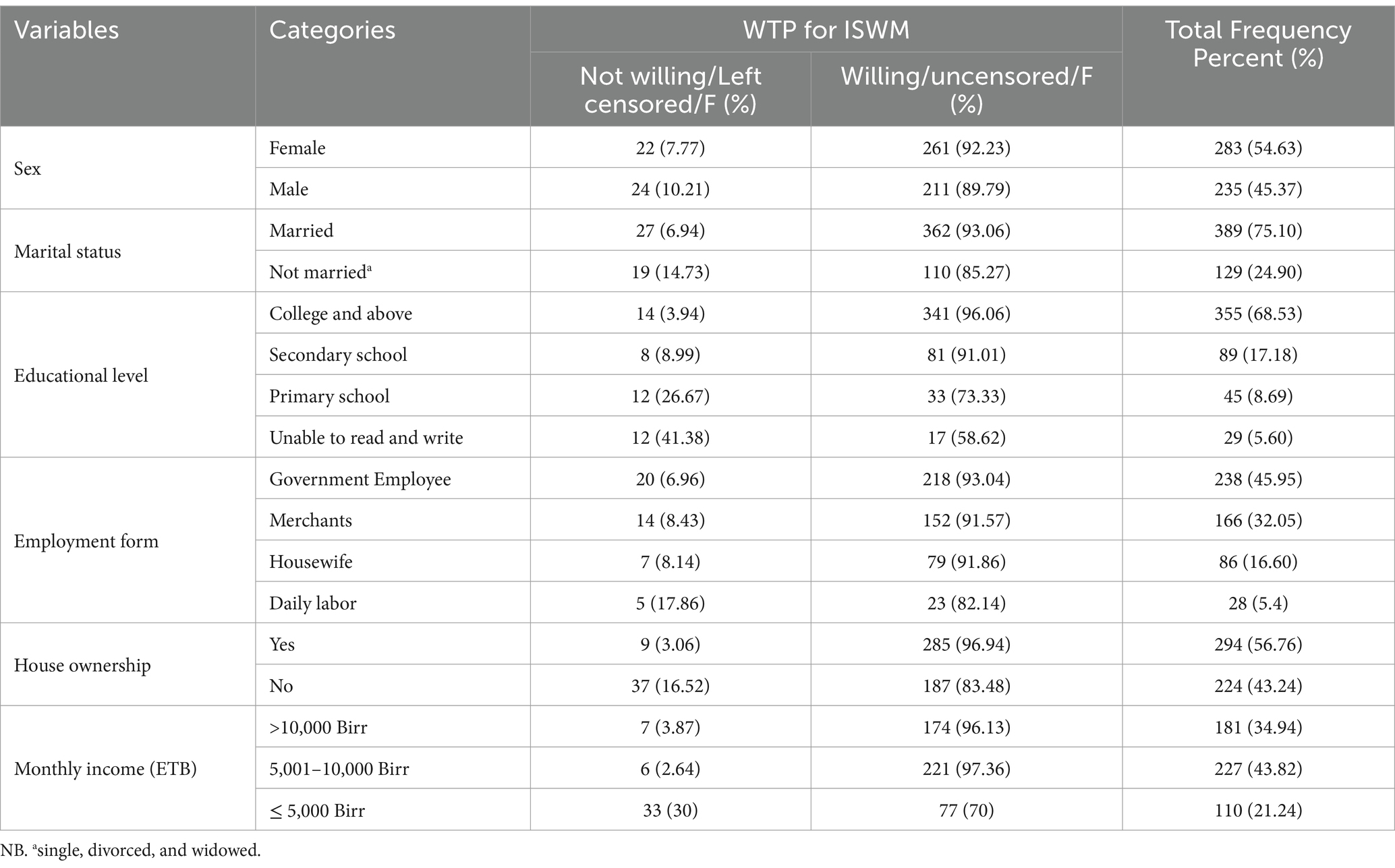
Table 1. Socioeconomic and demographic characteristics of household heads with WTP for ISWM in Debre Berhan town, Ethiopia, July 2022 (n = 518).
Solid waste management practice of households
A total of 230 households (44.4%) generated more than 2 Sacks of 50 kg of solid waste per week. A total of 461 (89%) households had a solid waste storage receptacle in their own home, with 437 (94.8%) households storing solid waste in a Keretit (Madaberia in 50 Kg) container. In addition, 281 (54.25%) household heads reported that they separated solid waste at home. Only 82 households (15.83%) reused the generated solid waste in their homes.
A total of 389 (75.1%) households used private collectors for solid waste disposal. These households pay an average of ETB 28 per month for this service, and 62 (11.97%) of households had individual pits for solid waste disposal, whereas 21 (4.05%) and 46 (8.88%) households still use prohibited practices, such as throwing it into a nearby river or along a street, respectively. A total of 469 households (90.54%) reported that the town government did not provide solid waste collection services (Table 2).
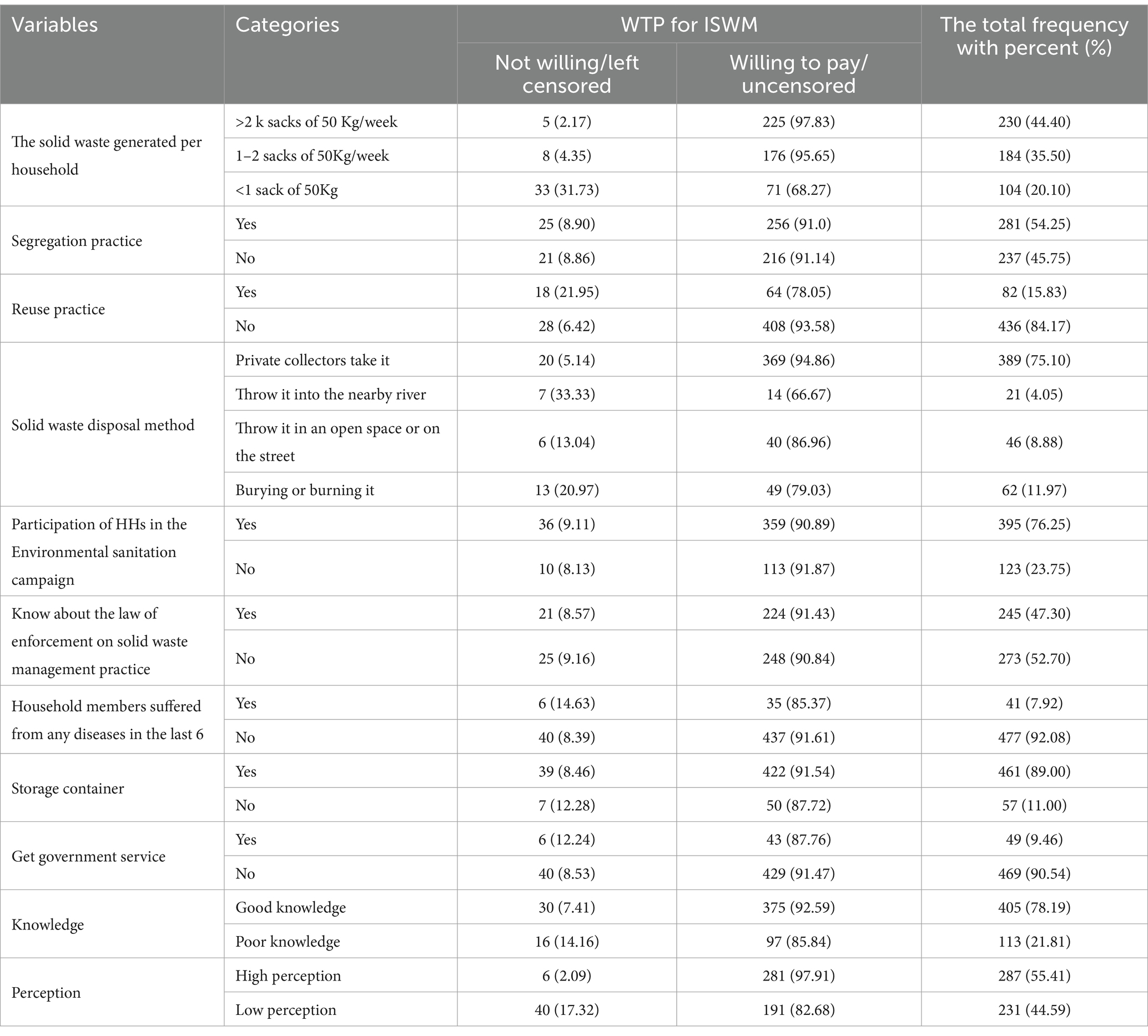
Table 2. Solid waste management practices of households with WTP for ISWM in Debre Berhan town, Ethiopia, July 2022 (n = 518).
Perception of households regarding solid waste management
The perception of household heads toward solid waste management and its problems was measured using a six-item Likert scale question. The frequency and percentage of responses to the Likert scale question items are presented in Table 3 below.
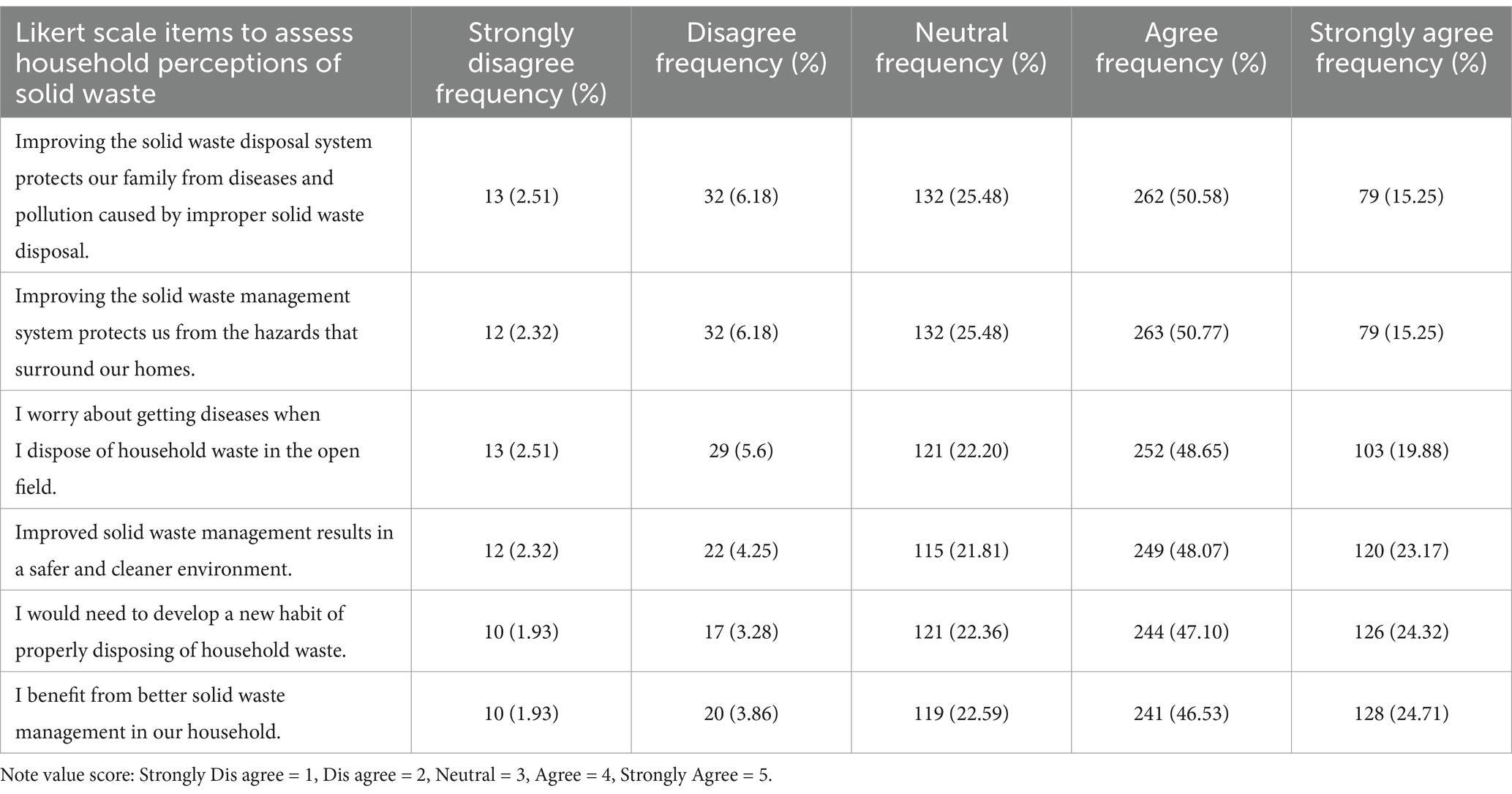
Table 3. Household heads perception response regarding solid waste management in Debre Berhan town, Ethiopia, in July 2022 (n = 518).
Generally, the possible perception score values ranged from 6 to 30, with a mean score was 23 (±4.6) and a score above the mean said to be good perception. Based on this result, 287 (55.41%) household heads had a good perception as shown in Figure 2.
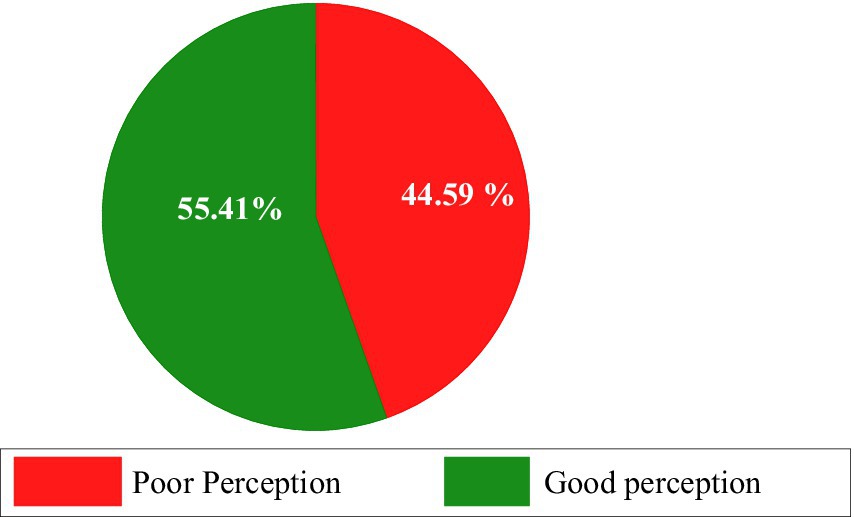
Figure 2. Categories of perception based on Likert scale question score results on households in Debre Berhan town, Ethiopia, July 2022.
Knowledge of household respondents about the solid waste management
A total of 514 (99.23%) household respondents in this study define solid waste. They define solid waste differently; 419 respondents (81.52%) define solid waste as useless material that exists in solid form. In addition, 484 (93.44%) household respondents were already aware that the open dumping of solid waste causes a variety of communicable diseases as well as environmental pollution. Furthermore, 506 (97.68%) participants had information about the municipal solid waste management system as shown in Table 4.
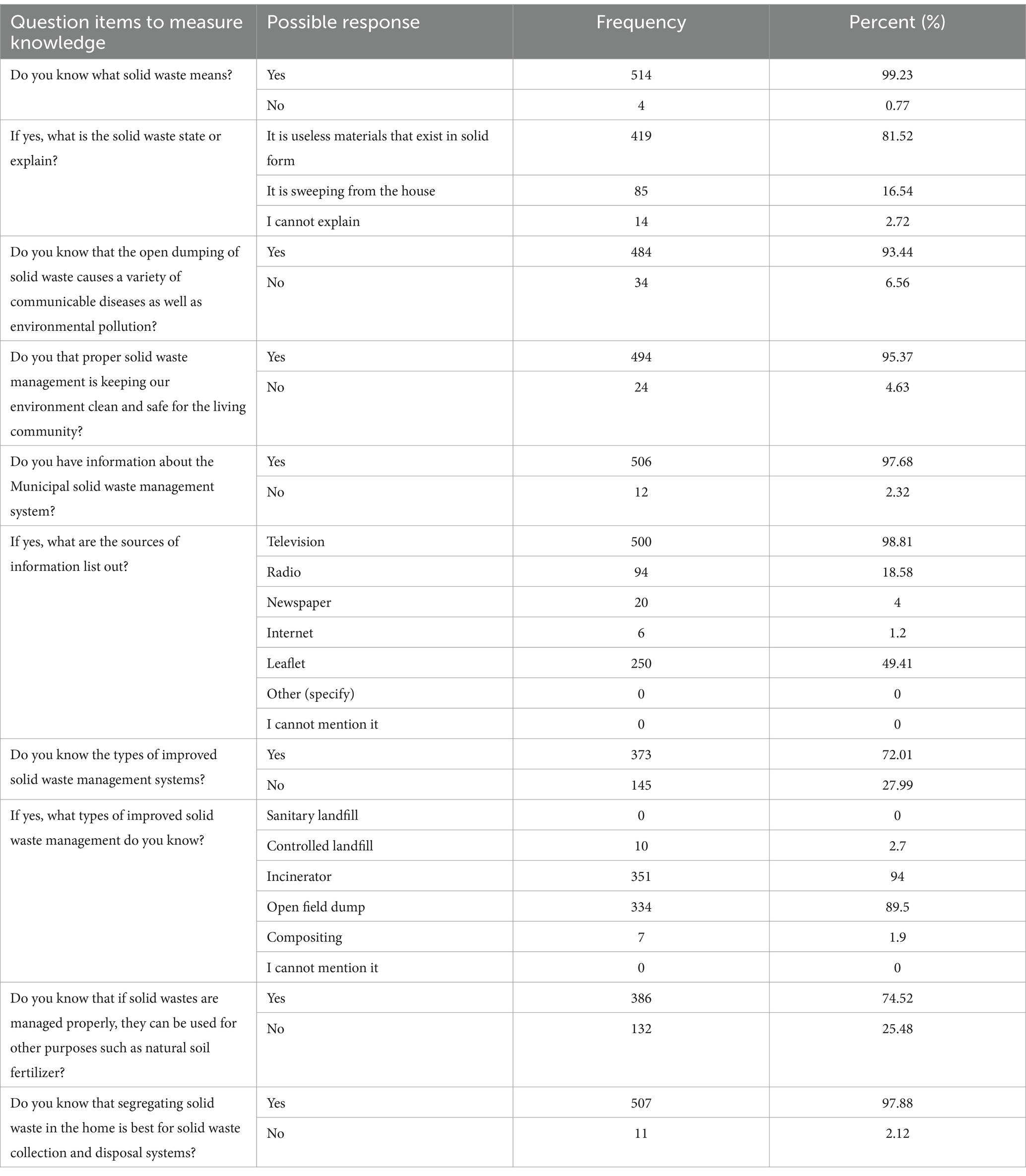
Table 4. Responses of household heads to a knowledge question in Debre Berhan town, Ethiopia, in July 2022 (n = 518).
Generally, in this research, the knowledge was measured using the above 10 question items and was calculated as composite scores. A total of 405 (78.19%) household heads have good knowledge, as shown in Figure 3.
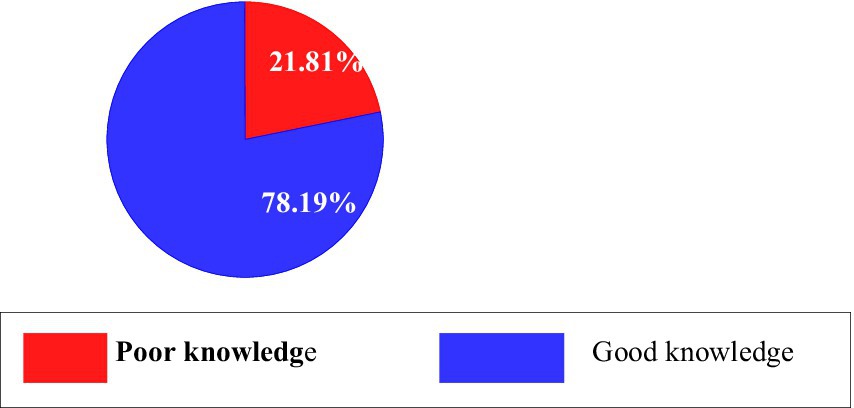
Figure 3. Categories of knowledge based on composite score results on households in Debre Berhan town, Ethiopia, July 2022.
Willingness to pay for improved solid waste management system
According to the findings of this study, 91.1% (95% CI: 88.1–93.5) of households were willing to pay for ISWM. The mean and standard deviation of the cost in Ethiopian Birr that households were willing to pay per month was 54.83 (95% CI: 52.53–57.13) ETB (± 26.65). A total of 327 (69.28%) household heads responded that the method of payment collection was included with the water bill, while 39.
(8.26%) household heads responded the payment was collected with electricity and 106 (22.46%) household heads paid it on their own self.
Furthermore, the range of maximum amount of money that the households were WTP for the ISWM is presented below (Figure 4).
On the other hand, 8.9% (95% CI: 6.7–11.7) of households were unwilling to pay for ISWM. Household heads were not WTP for ISWM for a variety of reasons, including the belief that proper solid waste management is the responsibility of the government, which accounted for 28.26% of the responses, as shown in Figure 5.
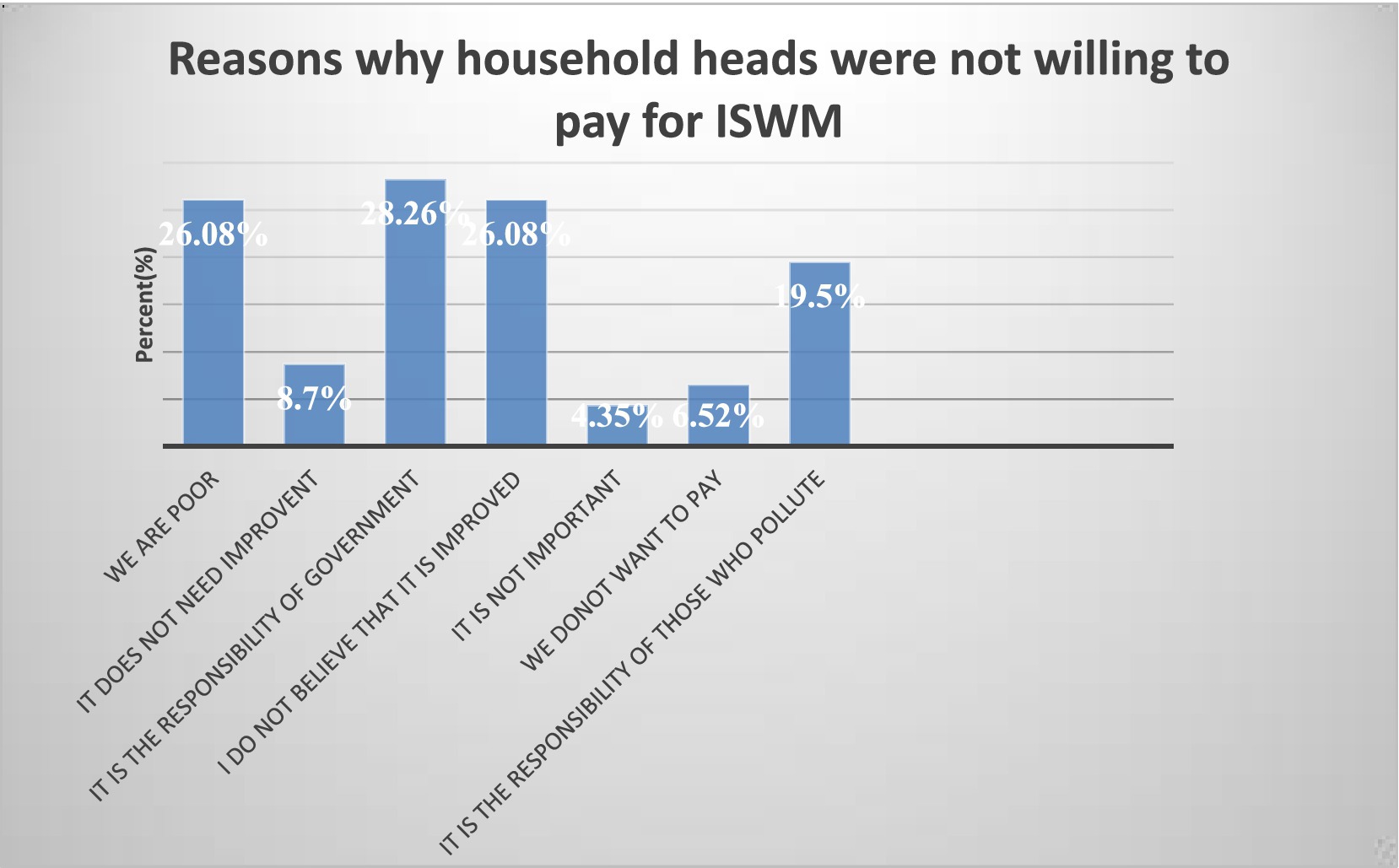
Figure 5. Reasons why household heads were not willing to pay for ISWM in Debre Berhan Town, Ethiopia, July 2022.
Factors associated with willingness to pay for improved solid waste management
In univariable Tobit regression model analysis, variables such as sex, age, marital status, employment status, educational level, house ownership, family size, time spent in the area, income, amounts of solid waste generated in the household, solid waste disposal methods practiced athome, access to government services, participation in environmental sanitation campaigns, knowledge and perception of household heads regarding solid waste management were selected for a multivariable regression model with WTP for ISWM services at a p ≤ 0.25. All those variables fitted into multivariable Tobit regression.
The multivariable Tobit regression model identified eight variables associated with WTP for the ISWM system at a p-value of ≤0.05 in 95% CI (Table 5).
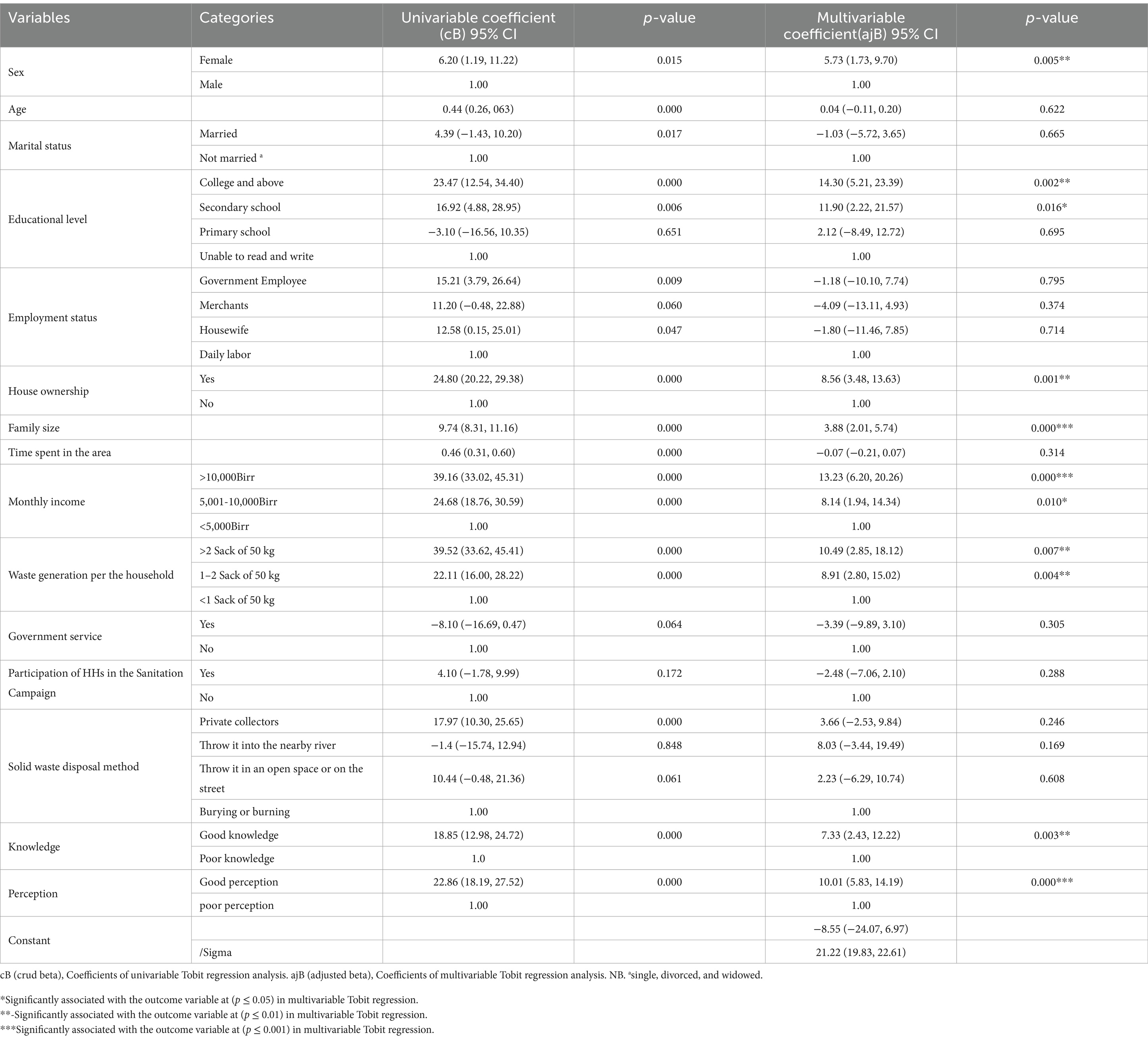
Table 5. Results of univariable and multivariable Tobit regression analyses of households’ WTP for ISWM in Debre Berhan town, Amhara, Ethiopia, in July 2022 (n = 518).
The multivariable analysis of Tobit regression revealed that female household heads were WTP 5.70 ETB more than their male counterparts (β = 5.73, 95% CI: 1.73–9.70). Similarly, household heads with the secondary and higher college education level were WTP 11.90 ETB (β = 11.90, 95% CI: 2.2221.57) and 14.30 ETB (β =14.30, 95% CI: 5.21–23.39) higher than those who were not unable to read and write, respectively. Similarly, household heads with house ownership were WTP 8.60 ETB more than those without (β = 8.56, 95% CI: 3.48–13.63).
As households’ family size increased by one person, their WTP for ISWM service increased by 3.90.
ETB (β = 3.88, 95% CI: 2.01–5.74). The households with middle and high income were WTP 8 ETB (β = 8.14, 95% CI: 1.94–14.34) and 13 ETB (β = 13.23, 95% CI: 6.20–20.26) more than those with low income, respectively.
The households that generate one to two sacks of 50kgs of waste per week and more than two sacks of 50kgs were WTP 8.90 ETB (β =8.91, 95% CI: 2.80–15.02) and 10.50 ETB (β =10.49, 95% CI: 2.85–18.12) more than those that generate less than one sack of 50kgs, respectively.
The household heads with good knowledge were WTP 7.30 ETB (β = 7.33, 95% CI: 2.43–12.22) more than those with poor knowledge. Furthermore, when all other variables were held constant, household heads with good perceptions were WTP 10 ETB (β = 10.01, 95% CI: 5.83–14.19) more than those with poor perceptions.
Discussion
The study’s findings indicate that to implement better solid waste management services, household willingness to pay and its determinant factors for overcoming financial constraints must be identified, and strategies that include households as stakeholders must be developed. Previous studies in Ethiopia reported that WTP for ISWM services ranged from 60.9 to 86.3% (Endalew, 2020; Ibsa, 2020). In this study, the overall likelihood of households’ willingness to pay for improved solid waste management was 91.1% (95% CI: 88.1–93.5). The WTP result in this finding significantly higher than the range reported in previous studies. This disparity might be explained by rapid urbanization, households’ need for service, and other differences such as study settings and types of CVM used in data collection methods.
Similarly, this study’s findings were significantly higher than studies reported in other countries like Kenya 64% (Long’ora et al., 2022), Ghana, 53.7% (Boateng et al., 2019), Cameroon, 85.1% (Veronica et al., 2019), Nigeria, 76.5% (Francisco et al., 2017), and China 63.9% (Yeung and Chung, 2018). This difference could be attributed to differences in socioeconomic characteristics and access to solid waste management services, as well as differences in the study setting and design, sources of population, and data collection methods. Governments in upper-middle-income countries, such as China, provide better solid waste management services to their citizens as part of a health prevention strategy. In this model, the government cover the majority of the costs while households are only responsible for proper waste collection and storage (Yeung and Chung, 2018; Jafari, 2020). As a result, empowering government services through household participation in ISWM service via WTP can address resource inefficiencies in low-income countries like Ethiopia.
However, this finding was lower than that reported in an Indian study, which was that 95% of households were willing to pay for ISWM services (Balasubramanian, 2019). This discrepancy could be explained by differences in the initial bidding value used for CVM. Other differences that could be attributed to household heads’ levels of awareness about solid waste management are also taken into account. For example, in India, the majority of household respondents believe that improper solid waste management is a major cause of health problems, particularly among children and the older adult (Balasubramanian, 2019). On the other hand, the findings of this study were in line with the findings reported in Pakistan (92.5%; Akhtar et al., 2017). This could be due to the households’ need for solid waste management services upgrades, such as increased collection efficiency and rates, the introduction of recycling facilities, waste segregation at the source, and disposal services.
Additionally, in this study, the mean amount of money household heads were WTP was 54.83 ETB, which was 24.83 ETB higher than the initial bid value of the fee (30 ETB). This demonstrates that households are more interested in contributing to the improvement of the waste management system than the current finding fee. This study’s result was higher than that of the study conducted in Injibara, Ethiopia (Mulat et al., 2019), which was 29.7 Birr. However, it is lower than that reported in China, which was approximately US$3.85–US$7.69 (Yeung and Chung, 2018), and Pakistan at approximately US$ 4.8 (Akhtar et al., 2017). One possible explanation for this disparity is the country’s socioeconomic status and level of development. These factors tend to increase household heads’ participation in solid waste management services through their WTP.
Regarding the associated factors of WTP for the ISWM system, female household heads were more willing to pay than male household heads. This finding was supported by research reported in Bahir Dar, Ethiopia (Endalew, 2020), Cameroon (Veronica et al., 2019), and Nigeria (Francisco et al., 2017). One explanation could be that women are in charge of household management, which includes cooking, cleaning, and waste disposal. On the other hand, this finding was inconsistent with the previous findings in Injibara Town in Ethiopia, where male household heads were more willing to pay than female household heads respondents (Mulat et al., 2019). This disparity might be that women had less economic decision-making power than men.
In this study, the educational status of household heads was also found to have a significant association with WTP for ISWM at a 5% significance level. This finding was similar to research conducted in Bahir Dar and Injibara town in Ethiopia (Mulat et al., 2019; Endalew, 2020), and also in other countries like—Rwanda (Constance NEM, 2021), Nigeria (Francisco et al., 2017), Ghana (Boateng et al., 2019), Iran (Jafari, 2020), China (Yeung and Chung, 2018), and Vietnam (Chinh et al., 2021). One possible explanation might be that educated people understand the consequences of poor waste management better, and educated household heads are more aware of SWM services. Because they want to live in a healthy and clean environment, they are more willing to pay for solid waste collection services. Furthermore, a higher education level is generally associated with a higher chance of settling for a well-paying job with a consistent income.
Household heads who owned the home were one of the predictor variables in this study, and it was significant at a 5% level. Similarly, research conducted in Malawi (Ndau and Tilley, 2018), Indonesia (Idris et al., 2021), and Nepal (Dhungana, 2017) supported the findings of this study. One possible explanation is that homeowners want to maintain a clean environment to increase the value of their property. Renters, on the other hand, have no such desire. However, this finding was contradicted by previously reported in Rwanda (Constance NEM, 2021), and Cameroon (Veronica et al., 2019) which found that home ownership did not affect a household’s willingness to pay. These could be household heads who do not own a home, but this does not preclude them from participating in WTP for ISWM services.
The coefficient of family size was found to have a positive relationship and a significant influence on households’ willingness to pay at a 5% significance level. A study reported in Vietnam (Chinh et al., 2021) supported this finding. That demonstrates that household heads with larger family sizes were willing to pay more than household heads with smaller family sizes. Because larger family-size households generate more waste managing a large amount of waste is relatively difficult (Dika et al., 2019). As a result, they choose to pay a higher price for solid waste management services. On the contrary, in the studies reported in Iran (Jafari, 2020) and China (Yeung and Chung, 2018), the size of the household’s family was found to have a negative and significant impact on the household’s willingness to pay for waste collection services. One possible explanation might be a decrease in the number of household family members and less waste generated. Therefore, household heads are wary of using and paying for services.
A Household’s monthly income, which has a positive coefficient, was also discovered to be a significant predictor of WTP for ISWM. This finding was supported by research in Ethiopia, Injibara Town (Mulat et al., 2019), and also other countries’ studies like Ghana (Boateng et al., 2019), Nigeria (Francisco et al., 2017), Vietnam (Chinh et al., 2021), and Pakistan (Akhtar et al., 2017). This could be due to high-income household heads’ need for a clean and healthy environment, making them more willing to use ISWM services and pay for improved services. Another explanation could be that higher-income household heads have a higher demand for quality waste management services and more WTP. Because they have enough money to pay for better services.
The household heads that generated more solid waste per week were found to be significantly associated factors with WTP for ISWM services. This finding was supported by studies in Ethiopia (Mulat et al., 2019; Endalew, 2020), Vietnam (Chinh et al., 2021), and China (Yeung and Chung, 2018). This could be because large amounts of solid waste are difficult to dispose of and it requires a high cost. Therefore, household heads need sustainable solid waste management services and are willing to pay for that service.
In this study, household heads having good knowledge of solid waste management was one of the predictor variables, and it had a positive relationship with WTP for SWM. This finding was supported by research conducted in Indonesia (Idris et al., 2021), Iran (Jafari, 2020), China (Yeung and Chung, 2018), and Vietnam (Vo Trung et al., 2020). One possible explanation might be when households are well-informed about environmental cleanliness and are aware of how waste management can aid in the resolution of environmental issues, they are more likely to feel personally motivated to use the service and are willing to pay for it. As a result, WTP was encouraged to use ISWM services to improve the living environment and prevent communicable diseases.
The last significant predictor variable for WTP for ISWM was household heads’ perception of solid waste management, with a positive coefficient indicating a positive relationship. This finding is supported by the study reported in Macau and Saudi Arabia (Labib et al., 2021; Liang et al., 2021), as well as in Malaysia (Fadhullah et al., 2022). This could be because households are willing to use and pay for services; after all, they are concerned about the consequences of poor solid waste management. This will have an impact on the intentions of households needing to be improved solid waste management service via WTP to create a conducive environment and prevent communicable disease transmission. This study had limitations in terms of response biases, which may overestimate or underestimate WTP results due to the use of self-reporting.
Conclusion
In this study, the overall likelihood of households’ and monthly willingness to pay for improved solid waste management systems was high. Being female, household heads who completed secondary and higher college, having private house, having large family size, increasing monthly income, amounts of solid waste generated in the household in the sack of 50 kg per week, good knowledge, and good perception toward solid waste management were significant factors of households’ WTP for ISWM system in Debre Berhan.
Recommendations
Based on the findings of this study, the following recommendations are made:
To Debre Berhan town municipality: The government should install ISWM services by using this initiation of HH participation in decision-making to WTP contributions for ISWM system to solve budget constraints.
To entrepreneurs and private waste collection service providers: Should provide door-to-door solid waste collection services based on solid waste management principles.
To Regulatory bodies, Health institutions, Kebele administrations, and other stakeholders including household heads: They should work together to improve and increase the quality and sustainability of the ISWM services.
To future researchers: This study assessed only the demand-side factors influencing the WTP at the household level. Further investigation is needed to explore the insights from food and drink establishments, commercial centers, and industries in Debre Berhan town.
Data availability statement
The datasets presented in this study can be found in online repositories. The names of the repository/repositories and accession number(s) can be found in the article/Supplementary material.
Ethics statement
The Institutional Review Board of Asrat Woldeyes Health Science Campus granted ethical clearance. In addition, the Asrat Woldeyes Health Science Campus School of Public Health wrote a supportive letter to the Debre Berhan Town municipality, which secured permission to conduct the study. Study participants provided informed written consent after being informed about the purpose of the study. Participants in the study were assured that their information would not be used for purposes other than scientific research and their participation was entirely voluntary. And also the data collectors explained the study’s aim, purpose, benefit, risk, discomfort, and right to refuse or withdraw at any time for any reason by applying Helensic principles (60). Furthermore, while the data collectors explained the interviews, participants were assured of their privacy and confidentiality. The individual’s identity was also not revealed, so the responses to the study were anonymous.
Author contributions
DX: Writing – review & editing, Writing – original draft, Visualization, Validation, Supervision, Software, Resources, Project administration, Methodology, Investigation, Funding acquisition, Formal analysis, Data curation, Conceptualization. WS: Writing – review & editing, Visualization, Validation, Supervision, Software, Resources, Project administration, Methodology, Investigation, Funding acquisition, Formal analysis, Data curation, Conceptualization. AG: Writing – review & editing, Visualization, Validation, Supervision, Software, Resources, Project administration, Methodology, Investigation, Funding acquisition, Formal analysis, Data curation, Conceptualization. BW: Writing – review & editing, Visualization, Validation, Supervision, Software, Resources, Project administration, Methodology, Investigation, Funding acquisition, Formal analysis, Data curation, Conceptualization.
Funding
The author(s) declare that no financial support was received for the research, authorship, and/or publication of this article.
Conflict of interest
The authors declare that the research was conducted in the absence of any commercial or financial relationships that could be construed as a potential conflict of interest.
Publisher’s note
All claims expressed in this article are solely those of the authors and do not necessarily represent those of their affiliated organizations, or those of the publisher, the editors and the reviewers. Any product that may be evaluated in this article, or claim that may be made by its manufacturer, is not guaranteed or endorsed by the publisher.
Supplementary material
The Supplementary material for this article can be found online at: https://www.frontiersin.org/articles/10.3389/frsus.2024.1463777/full#supplementary-material
References
Akhtar, S., Nadeem, V. M., Shahid, I., and Ikram, A. (2017). Assessment of willingness to pay for improved air quality using contingent valuation method. doi: 10.22034/gjesm.2017.03.03.005
Akhtar, S., Qureshi, M. I., and Shahraz, S. (2017). Households’ willingness to pay for improved solid waste management Department of Environmental Science, Kinnaird College for Women, 93- Jail Road, Lahore, Pakistan. Glob. J. Environ. Sci. Manage. Spring 3, 143–152.
Association WM Helsinki, DO. (2013). Ethical principles for medical research involving human subjects.
Balasubramanian, M. (2019). Household willingness to pay for improved solid waste management services: using contingent valuation analysis in India.
Bamlaku, A., Abera, T., Solomon, E., and Paulos, T. (2019). Household willingness to pay for improved solid waste Management in Shashemene Town, Ethiopia. Afr. J. Environ. Sci. Technol. 13, 162–171. doi: 10.5897/AJEST2019.2663
Boateng, K. S., Agyei-Baffour, P., Boateng, D., Rockson, G. N. K., Mensah, K. A., and Edusei, A. K. (2019). Household willingness-to-pay for improved solid waste Management Services in Four Major Metropolitan Cities in Ghana. J. Environ. Public Health 2019:5468381. doi: 10.1155/2019/5468381
Chinh, P. C., Hung, N. T. Q., Ky, N. M., Ai, N. T. L., and Tam, N. M. (2021). Willingness to pay for improving household solid waste Management in Vietnam. App. Environ. Res. 43, 1–14. doi: 10.35762/AER.2021.43.2.1
Constance NEM (2021). Households’ willingness to pay for solid waste collection Services in Secondary Cities of Rwanda.
Dhungana, AR. (2017). Determinants of willingness to pay for improved solid waste management system in Lekhnath, Kaski, Nepal.
Dika, G., Nemie, A., and Birhane, E. (2019). Household’s willingness to pay for improved solid waste Management in Gulelle sub City, Addis Ababa. Energy Environ. Eng. 6, 1–7. doi: 10.13189/eee.2019.060101
Endalew, KTB (2020). Willingness to pay for improved solid waste management services and associated factors among urban households.
Fadhullah, W., Imran, N. I. N., Ismail, S. N. S., Jaafar, M. H., and Abdullah, H. (2022). Household solid waste management practices and perceptions among residents in the East Coast of Malaysia. BMC Public Health 22:1. doi: 10.1186/s12889-021-12274-7
Fleischman Foreit, Karen G., and Foreit, James R. (2004). Willingness to Pay Surveys for Setting Prices for Reproductive Health Products and Services A User’s Manual.
Francisco, O. H., Yacob, M. R., Adamu, A., and Zainudin, N. A. I. M. (2017). Willingness to pay for improved solid waste management commercial area of Sango, Ogun State Nigeria. IOSR J. Environ. Sci. Toxicol. Food Technol. 11, 82–88.
Hirpe, L., and Yeom, C. (2021). Municipal solid waste management policies, practices, and challenges in Ethiopia: a systematic review. Sustainability 13:11241. doi: 10.3390/su132011241
Ibsa, D. B. (2020). Estimating households’ maximum willingness to pay for improved solid waste management services: in case of Batu town administration: Oromia, Ethiopia. Int. J. Econ. Energy Environ. 5:74. doi: 10.11648/j.ijeee.20200505.12
Idris, I., Putri, D. Z., Azhar, Z., Martha, J., and Yeni, I. (2021). Willingness to participate in the analysis of urban waste management in West Sumatra, Indonesia. Jurnal Perspektif Pembiayaan dan Pembangunan Daerah. 9, 115–126. doi: 10.22437/ppd.v9i2.12119
Jafari, SM. (2020), Willingness to pay for improved residential waste management in a developing country.
Sajise, Asa Jose, Samson Jindra Nuella, G., Lotis, Quiao, Jasmin, Sibal, Raitzer David, A., and Dieldre, Harder. (2021). Contingent valuation of non-market benefits in project economic analysis a guide to good practice.
Labib, O. A., Manaf, L., Sharaai, A. H., and Zaid, S. S. M. (2021). Understanding the effect of internal and external factors on Households’ willingness to Sort waste in Dammam City, Saudi Arabia. Int. J. Environ. Res. Public Health 18:9685. doi: 10.3390/ijerph18189685
Liang, Y., Song, Q., Liu, G., and Li, J. (2021). Uncovering residents and restaurants’ attitude and willingness toward effective food waste management: A case study of Macau. Waste Manag. 130, 107–116. doi: 10.1016/j.wasman.2021.05.021
Long’ora, A. E., Oindo, B. O., and Kuya, R. M. (2022). Influence of levels of awareness, willingness to pay, and incentives on solid waste management practices by commercial Enterprises in Kakamega Town. Europ. J. Environ. Earth Sci. 3, 7–13. doi: 10.24018/ejgeo.2022.3.1.236
Mlpppbb, Mishra. (2021). Factors that affect the willingness oF residents to pay for solid waste Management in Bhubaneswar.
Mulat, S., Worku, W., and Minyihun, A. (2019). Willingness to pay for improved solid waste management and associated factors among households in Injibara town, Northwest Ethiopia. BMC. Res. Notes 12:401. doi: 10.1186/s13104-019-4433-7
Ndau, H., and Tilley, E. (2018). Willingness to pay for improved household solid waste collection in Blantyre, Malawi. Economies 6:54. doi: 10.3390/economies6040054
Obsa, O., Tadesse, M., Kim, D.-G., Asaye, Z., Yimer, F., Gebrehiwot, M., et al. (2022). Organic waste generation, and its valorization potential through composting in Shashemene, southern Ethiopia. Sustain. For. 14:3660. doi: 10.3390/su14063660
Rimer, B. K., and Glanz, K. (2005). Theory at a glance: A guide for health promotion practice. Bethesda, MD: US Department of Health and Human Services, National Institutes of Health, National Cancer Institute.
Ssemugabo, C., Wafula, S. T., Lubega, G. B., Ndejjo, R., Osuret, J., Haulage, A. A., et al. (2020). Status of household solid waste management and associated factors in a slum Community in Kampala, Uganda. J. Environ. Public Health 2020:6807630. doi: 10.1155/2020/6807630
Steigenberger, C., Flatscher-Thoeni, M., Siebert, U., and Leiter, A. M. (2022). Determinants of willingness to pay for health services: a systematic review of contingent valuation studies. Europ. J. Health Econ. doi: 10.1007/s10198-022-01437-x
Veronica, E. M., and Oru TO Martin, N. N. (2019). Household perception and willingness to pay for improved waste management service in Mamfe, Cameroon. Afr. J. Environ. Sci. Technol. 13, 354–364. doi: 10.5897/AJEST2019.2681
Vo Trung, H., Viet Nguyen, T., and Simioni, M. (2020). Willingness to pay for mangrove preservation in Xuan Thuy National Park, Vietnam: do household knowledge and interest play a role? J. Environ. Econ. Policy 9, 402–420. doi: 10.1080/21606544.2020.1716854
WHO/HEP/ECH/EHD/21.02. (2021). Solid waste. In: Compendium of WHO and other UN guidance on health and environment. Geneva.
Yeung, I. M. H., and Chung, W. (2018). Factors that affect the willingness of residents to pay for solid waste management in Hong Kong. Environ. Sci. Pollut. Res. Int. 25, 7504–7517. doi: 10.1007/s11356-017-1009-8
Keywords: contingent valuation method, Debre Berhan town, solid waste, willingness to pay, Ethiopia
Citation: Chernet D, Sema W, Gebeyehu A and Wogayehu BT (2024) Willingness to pay for improved solid waste management and associated factors among households in Debre Berhan town, North Shoa Zone, Amhara, Ethiopia, 2022. Front. Sustain. 5:1463777. doi: 10.3389/frsus.2024.1463777
Edited by:
Alberto Paucar-Caceres, Manchester Metropolitan University, United KingdomReviewed by:
Ming-Qiang Zhu, Northwest A and F University, ChinaShi Xue, University of Illinois at Urbana-Champaign, United States
Copyright © 2024 Chernet, Sema, Gebeyehu and Wogayehu. This is an open-access article distributed under the terms of the Creative Commons Attribution License (CC BY). The use, distribution or reproduction in other forums is permitted, provided the original author(s) and the copyright owner(s) are credited and that the original publication in this journal is cited, in accordance with accepted academic practice. No use, distribution or reproduction is permitted which does not comply with these terms.
*Correspondence: Dawit Chernet, ZGNjaGVybmV0NEBnbWFpbC5jb20=
 Dawit Chernet
Dawit Chernet Wondimu Sema2
Wondimu Sema2 Belachew Tekleyohannes Wogayehu
Belachew Tekleyohannes Wogayehu